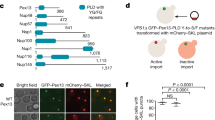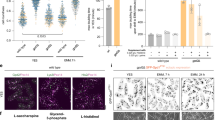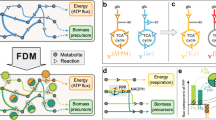Abstract
THE synthesis of fatty acids from acetate has been shown to occur in particle-free supernatant fractions obtained from a variety of mammalian tissues1–3. An examination of the literature4–7 reveals that such synthesis is significantly increased in the presence of a microsomal fraction. (While the term microsome may be used to describe the particle fraction prepared from liver, it is premature to refer to yeast particles by this name since the cytological fractionation of the yeast cell is less well established. As used here, the term particles refers to the fraction sedimented, after prior removal of the mitochondrial fraction, at 100,000g for 45 min. ‘Supernatant’ refers to the solution obtained after removal of the 100,000g pellet.) We have shown, for example, that the addition of rat liver microsomes, in appropriate amounts, results in an increase in the incorporation of acetate carbon into fatty acids many times greater than that observed with the rat liver supernatant fraction alone8. Similar observations have been made with a yeast system9.
This is a preview of subscription content, access via your institution
Access options
Subscribe to this journal
Receive 51 print issues and online access
$199.00 per year
only $3.90 per issue
Buy this article
- Purchase on Springer Link
- Instant access to full article PDF
Prices may be subject to local taxes which are calculated during checkout
Similar content being viewed by others
References
Wakil, S. J., J. Lipid Res., 2, 1 (1961).
Brady, R. O., J. Biol. Chem., 235, 3099 (1960).
Martin, D. B., Horning, M. G., and Vagelos, P. R., J. Biol. Chem., 236, 663 (1961).
Matthes, K. J., Abraham, S., and Chaikoff, I. L., Biochim. Biophys. Acta, 37, 180 (1960).
Abraham, S., Matthes, K. J., and Chaikoff, I. L., Biochim. Biophys. Acta, 36, 556 (1959).
Fletcher, K., and Myant, N. B., J. Physiol., 155, 498 (1961).
Popják, G., and Tietz, A., Biochem. J., 60, 147 (1955).
Matthes, K. J., Abraham, S., and Chaikoff, I. L., J. Biol. Chem., 235, 2560 (1960).
Klein, H. P., J. Bacteriol., 73, 530 (1957).
Langdon, R. G., J. Biol. Chem., 226, 615 (1957).
Den, H., and Klein, H. P., Biochim. Biophys. Acta, 49, 429 (1961).
Swick, R. W., and Wood, H. G., Proc. U.S. Nat. Acad. Sci., 46, 28 (1960).
Numa, S., Matsuhashi, M., and Lynen, F., Biochem. Z., 334, 203 (1961).
Abraham, S., Matthes, K. J., and Chaikoff, I. L., J. Biol. Chem., 235, 2551 (1960).
Abraham, S., Matthes, K. J., and Chaikoff, I. L., Biochim. Biophys. Acta, 49, 268 (1961).
Author information
Authors and Affiliations
Rights and permissions
About this article
Cite this article
ABRAHAM, S., CHAIKOFF, I., BORTZ, W. et al. Particle Involvement in Fatty Acid Synthesis in Liver and Yeast Systems. Nature 192, 1287–1288 (1961). https://doi.org/10.1038/1921287a0
Issue Date:
DOI: https://doi.org/10.1038/1921287a0
This article is cited by
-
Mechanisms and physiological roles of fatty acid chain elongation in microsomes and mitochondria
Molecular and Cellular Biochemistry (1973)
Comments
By submitting a comment you agree to abide by our Terms and Community Guidelines. If you find something abusive or that does not comply with our terms or guidelines please flag it as inappropriate.



